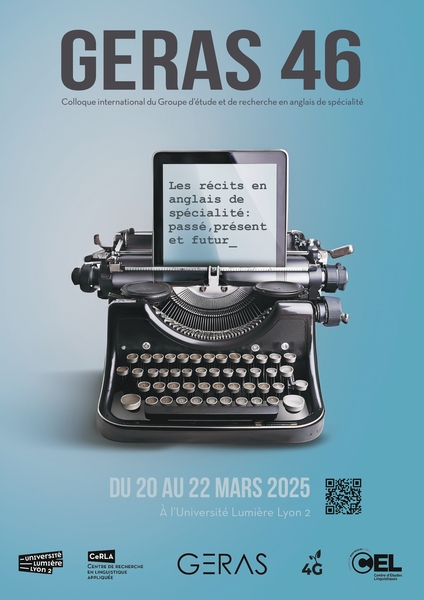Call for papers
46th GERAS International conference (March 2025) University of Lumière Lyon II, France Narratives in ESP: Past, present & future March 20-21-22, 2025 In 1969, Gérard Genette defined narratives as “the representation of an event or series of events, real or fictitious, by means of language, and more particularly written language” (1969, 49). Whether in stories, novels, films or TV series, narratives are a recurrent object of research in English for Specific Purposes (ESP). This is no doubt because many specialized phenomena (e.g., corporate life, medical treatments, trials, scientific protocols) have a beginning and an end, whether they are happy or unhappy. Without narratives, specialized phenomena would probably be only synchronic descriptions of mechanisms and processes, independent of any dynamic perspective, whether individual or collective. By anchoring specialized phenomena in a form of temporality, narratives highlight issues which are central to specialized domains and their stakeholders, such as the ethical dilemma of the surgeon, social worker or manager faced with decision-making, the euphoria and the despair of traders in the face of stock market fluctuations, or the anxiety caused by climate change. Specialized narratives, and the storytelling process, therefore lie at the intersection of the pragmatic fact and the fable. But, as neuropsychologist Oliver Sacks so aptly summed up in his great collection of clinical essays: “What facts! What fables!” (1985, xi). The study of the narrative part of specialized discourses is a potentially immense field of research, given that these discourses are nowadays deployed through a wide variety of channels, be they written, oral or multimodal. While the comparison of fictions with scientific and technical texts (Bensoussan 1990) is undoubtedly a starting point in the study of specialized narratives, most studies of the narrative part of specialized discourse take the form of genre analysis. While some studies show that specialized fictional narratives (FASP) may be considered a narrative genre in its own right, other studies have specifically dealt with the narrative part of genres such as corporate annual reports (Ren & Lu 2021). Furthermore, the analysis of narratives makes it possible to approach certain underlying cultural characteristics in Please send your abstracts (300–500 words with up to 10 bibliographical references max) to philippe.millot@univ-lyon2.fr and severine.wozniak@univ-lyon2.fr before 19 December 2024.
Bibliographical references Bosher, Susan & Joel Stocker. 2015. « Nurses’ Narratives on Workplace English in Taiwan: Improving Patient Care and Enhancing Professionalism ». English for Specific Purposes 38: 109–20. https://doi.org/10.1016/j.esp.2015.02.001. Domenec, Fanny. 2016. « ‘How Technology has Changed our Lives’ : la mise en récit du discours de l’entreprise dans America’s Farmers ». In La mise en récit dans les discours spécialisés, edited by Catherine Resche, 161–183. Berne : Peter Lang. Genette, Gérard. 1969. Figures II. Paris : Éditions du Seuil, coll. « Essais ». Ren, Chaowang & Xiaofei Lu. 2021. “A Multi-Dimensional Analysis of the Management’s Discussion and Analysis Narratives in Chinese and American Corporate Annual Reports.” English for Specific Purposes 62: 84–99. https://doi.org/10.1016/j.esp.2020.12.004. Resche, Catherine. 2019. « Des ‘taches solaires’ et des ‘vagues’, au ‘cheval à bascule’ et au ‘pendule’ : que nous apprend l’étude des métaphores du cycle économique sur un siècle (1850-1950) ? » ASp 76 (1) : 29-47. https://doi.org/10.4000/asp.6013. Sacks, Oliver. 1985. The Man who Mistook his Wife for a Hat. London: Picador.
|







